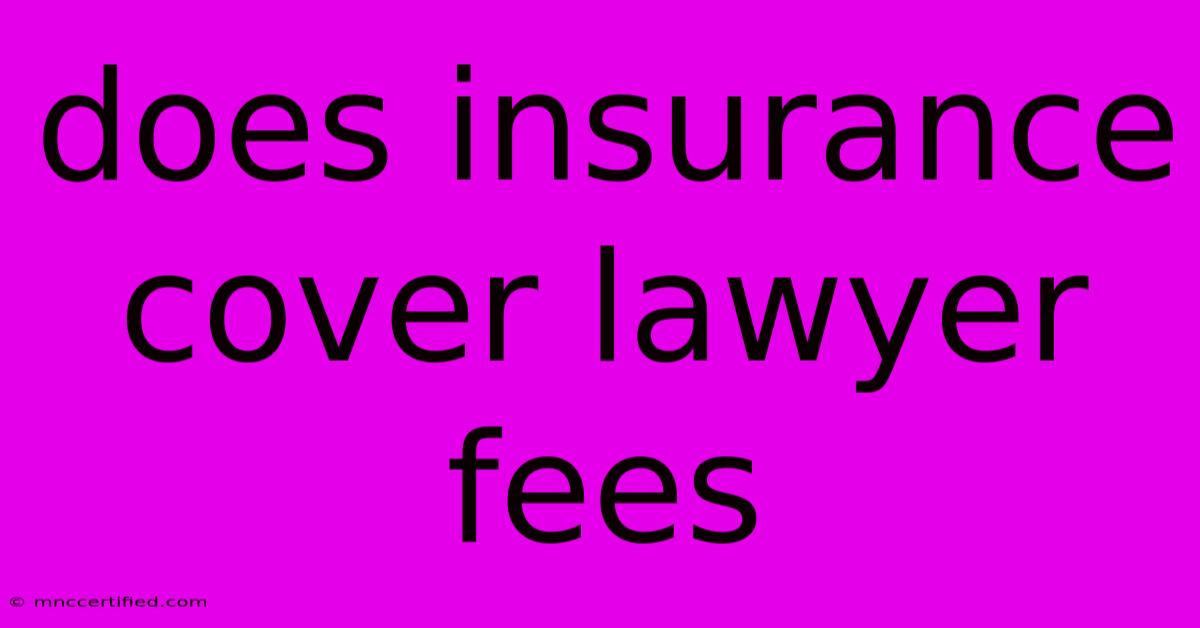Does Insurance Cover Lawyer Fees

Table of Contents
Does Insurance Cover Lawyer Fees? A Comprehensive Guide
Many people wonder, "Does my insurance cover lawyer fees?" The answer, unfortunately, isn't a simple yes or no. Whether your insurance covers legal expenses depends on several factors, including the type of insurance, the circumstances surrounding the legal issue, and the specific policy you hold. This comprehensive guide will delve into the complexities of insurance coverage for lawyer fees.
Types of Insurance and Legal Coverage
Several types of insurance might offer some legal expense coverage, but it's crucial to understand the limitations:
1. Homeowners and Renters Insurance
Homeowners and renters insurance primarily covers property damage and liability. While some policies might include limited legal defense coverage if you're sued for something covered by the policy (e.g., a guest is injured on your property), this is usually limited to the defense of the claim, not broader legal expenses. Don't assume your homeowners or renters insurance will cover legal fees for unrelated matters like a divorce or a traffic ticket. Always check your policy documents.
2. Auto Insurance
Auto insurance policies typically cover legal representation if you're involved in an accident that results in a lawsuit. However, this coverage usually applies only to liability claims – if you're sued for causing an accident. It generally doesn't cover legal fees for pursuing a claim against another driver, even if your insurer is handling the claim for you. Again, review your policy carefully. Understanding the difference between liability and collision coverage is key.
3. Health Insurance
Health insurance rarely covers lawyer fees directly. While some plans might cover mental health services related to a stressful legal case (like therapy), they typically won't pay your lawyer's bills.
4. Professional Liability Insurance (Errors & Omissions Insurance)
Professionals like doctors, lawyers, and accountants often carry professional liability insurance. This insurance covers legal fees and judgments resulting from errors or omissions in their professional services. This is a specialized type of coverage and doesn't apply to personal legal issues.
5. Umbrella Insurance
An umbrella insurance policy provides additional liability coverage above and beyond what your other policies (like auto or homeowners) offer. While this could potentially extend to legal defense costs in certain situations, it's crucial to examine the specifics of your policy.
What to Look For in Your Policy
Regardless of the type of insurance, carefully review your policy documents. Look for clauses related to:
- Legal defense coverage: This outlines situations where your insurer will pay for legal representation.
- Liability coverage: This covers situations where you're legally responsible for someone else's damages.
- Exclusions: This section details situations or circumstances that are specifically not covered by your policy.
When Insurance Likely Won't Cover Lawyer Fees
Insurance policies generally won't cover legal fees for:
- Personal injury claims (unless related to an auto accident covered under your policy): If you're injured in a car accident, your insurer might handle your claim against the other driver but not pay for your attorney's fees, especially if your damages are small. If you are seeking compensation in a lawsuit for personal injuries, you might need to pay for your lawyer up front or with a contingency fee.
- Family law matters: Divorces, child custody battles, and other family law issues are almost never covered by insurance.
- Criminal defense: Insurance policies don't cover legal fees associated with criminal charges.
- Contract disputes (unless related to a business covered by your policy): If you're involved in a business contract dispute, professional liability insurance might apply, but only in some specific cases.
- Most Traffic Violations: These are generally considered your responsibility.
Alternatives to Insurance Coverage for Lawyer Fees
If your insurance doesn't cover legal fees, consider these alternatives:
- Legal aid societies: Offer free or low-cost legal services to low-income individuals.
- Pro bono services: Some lawyers offer free services to those who qualify.
- Payment plans: Negotiate a payment plan with your lawyer.
- Contingency fee arrangements: The lawyer gets paid a percentage of any settlement or judgment won.
Disclaimer: This information is for general guidance only and does not constitute legal advice. Always consult your insurance policy and seek advice from a qualified legal professional for specific legal questions. The specifics of insurance coverage vary widely depending on the insurer, the policy, and the jurisdiction.

Thank you for visiting our website wich cover about Does Insurance Cover Lawyer Fees. We hope the information provided has been useful to you. Feel free to contact us if you have any questions or need further assistance. See you next time and dont miss to bookmark.
Featured Posts
-
Insurance Fire Investigator Jobs
Nov 21, 2024
-
Public Response To Jaguars Rebranding
Nov 21, 2024
-
19 35 An Hour Is How Much A Year
Nov 21, 2024
-
Trt Therapy Covered By Insurance
Nov 21, 2024
-
Warren Public Works Winter Season
Nov 21, 2024